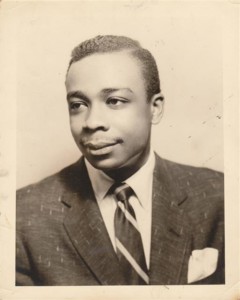This year’s national Black History Month theme is “The Black Family: Representation, Identity, and Diversity.” As Prairie View A&M University (PVAMU) celebrates this annual moment, we should consider other actors along with the usual names of Coretta Scott and Martin King, Myrlie and Medgar Evers, Betty and Malcolm (Omowale) Shabazz, Ella Baker, Gloria Richardson, Kathleen Cleaver, and Diane Nash. All of these individuals are worthy of recognition; however, so too is PVAMU’s own Imari Obadele.
A professor, author, reparations advocate, and political prisoner, Obadele is best known as co-founder of both the Republic of New Afrika (RNA) and the National Coalition of Blacks for Reparations in America (N’COBRA). The former is important in reminding us of the need for land and independence from settler colonists and their imperial project. The latter is a continuum of the work of Callie Guy House and others who came before her who demanded redress from our oppressors on behalf of African captives.
Few knew that Obadele, a Philadelphia native, was actually born Richard Bullock Henry in 1930 to his homemaker mother, Vera Robinson Henry, and his father, Walter Henry, a postal worker and deacon at Christ Community and Union Baptist churches. The Philadelphia Urban League selected them as the 1966 “Family of the Year.” Raised with eleven siblings in the Point Breeze neighborhood, Obadele was a Boy Scout and one of six African Americans in his graduating class at the public all-male “People’s College,” Central High School.
Before President Truman’s 1948 executive order-9981, which ended segregation in the Armed Forces, Obadele protested military segregation by encouraging Blacks to dodge the draft. In 1950, he helped incorporate United Negro Assemblage to address issues of education, job discrimination, political representation, police brutality, and three years later, hosted W.E.B. Du Bois’ Philadelphia visit.
In the early 1950s, Obadele moved to Detroit, where he worked as a reporter for the Michigan Chronicle (1953-1956) and as a technical writer for the U.S. Army Tank-automotive and Armaments Command. Also, while in the Motor City, he adopted his Yoruba name, “the king arrives at home,” and co-founded four important civil rights organizations: Group on Advanced Leadership (1962), the Michigan Freedom Now Party (1963), the Malcolm X Society (1967), and the RNA.
At the 1968 initial RNA meeting, hundreds of attendees signed a declaration of independence from the U.S., creating a government in exile that included notable cabinet-level comrades such as Bahiyah Betty Shabazz, Queen Mother Audley E. Moore, Robert F. Williams, Chokwe Lumumba, Herman Ferguson, Maulana Karenga, Amiri Baraka, and Jamil Abdullah Al-Amin.
The RNA called for the creation of a Black self-governing nation-state to encompass Alabama, Georgia, Louisiana, Mississippi, and South Carolina. Additionally, it demanded billions of dollars in financial compensation for the holocaust of enslavement and subsequent inhumane mistreatment of Black people. The FBI labeled the RNA a “terrorist organization” and dubbed Obadele as a “Key Black Extremist.” The federal government subsequently targeted him in the 1970s, leading to a conspiracy to assault a federal agent conviction.
Obadele served five years in Mississippi jails and federal prisons, where he continued to be an unapologetic apostle of African liberation and advocate for Puerto Rican independence, Native American sovereignty, and the immediate release of all political prisoners. He frequently received phone calls from Rosa Parks, who made it known to prison officials that she was monitoring their behavior to ensure his safety. Amnesty International counted him among “prisoners of conscience” being held for nonviolent political expression.
After his release, Obadele went on to author several books, earn a Temple University Ph.D. in 1985, and co-found N’COBRA two-years later. He taught at Beaver, Wooster, Oberlin, and William Patterson Colleges. In 1990, he moved to Houston to teach political science at Prairie View A&M University, where he remained until 2002.
As PVAMU undergraduates, Drs. Maya Rockeymoore Cummings and Melanye Price took his classes. Dr. Price recalled that Obadele’s advocacy was advanced for the period. “When I was a student,” she recently said, “I learned a lot about his work on reparations. At that time, groups like N’COBRA were seen as fringe, but 30 years later, their demands have been introduced as Congressional legislation (H.R.40), taken up by Harvard law professors, and mentioned in presidential debates.” The political science endowed professor and inaugural director of the Ruth J. Simmons Center for Race and Justice, Dr. Price further elaborated on Obadele’s legacy, stating, he “represented an alternative model of Black radical leadership that forced the students he taught to grapple with their own ideas of what it means to be Black in America and to be a contributing community citizen.”
After a stroke in Atlanta on January 18, 2010, Imari Abubakari Obadele joined the ancestors. “Free the Land!” continues to resonate among thousands of committed RNA followers who saw Odadele epitomize Family, Identity, and Diversity of ideas.
A Prairie View A&M University professor of History, Will Guzmán is co-editing with David H. Jackson, Jr., Maceo C. Dailey’s Emmett J. Scott: Power Broker of the Tuskegee Machine (Texas Tech University Press, December 2021). Guzmán tweets at @ebeyiye.

